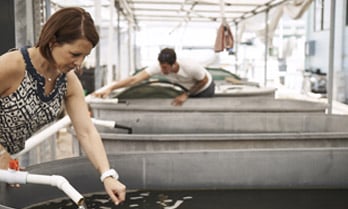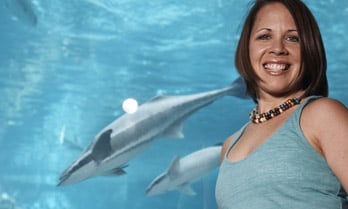Dr Vanessa Kellermann, evolutionary biologist, Monash University, Melbourne
01 September 2014
How flies can help us predict the future
Our planet’s climate is changing. How will bees cope—will they still be able to pollinate our crops? Will dengue and malaria–carrying mosquitoes spread south?
Vanessa Kellermann works with native fruit fly species from Tasmania to tropical Queensland to find out. She has already demonstrated that tropical flies are more vulnerable to change in the long term. They don’t have the genetic capacity to evolve quickly.
Her L’Oréal For Women in Science Fellowship allowed her to explore how flexible they are in the short term—how individual insects can respond to change during their lifetimes.
“No one sets out to study flies,” she says. But they are perfect for asking basic questions that will allow us to create models of evolution and help people—from farmers to health professionals—plan for change.
Qualifications
| 2008 | PhD (evolutionary biology), The University of Melbourne |
| 2003 | Bachelor of Science (Honours) (genetics), La Trobe University, Melbourne |
Career highlights, awards, fellowships, grants
| 2014–present | ARC Postdoctoral Research Fellow, Discovery Early Career Research Award, Buffering climate change—Predicting the evolution of phenotypic plasticity, Monash University, Melbourne |
| 2014 | Theo Murphy High Flyers Think Tank: Climate change challenges to health; Risks and opportunities, hosted by the Australian Acedmy of Science |
| 2012–2013 | Postdoctoral Researcher,Linking genomes to adaptive variation in 20 Drosophila species, Monash University, Melbourne |
| 2011 | Speaker, Identifying phylogenetic and ecological constraints limiting species distributions: a 100 Drosophilaspecies comparison, 13th Congress for the European Society of Evolutionary Biology, Tubingen, Germany |
| 2009–2011 | Postdoctoral Fellow, Determining the role of ecology vs. phylogeny in the evolution of stress resistance: a 100 species |
| 2010 | Invited presentation, Evolution of temperature and dehydration tolerance in Drosophilids. Society for Experimental Biology, Prague, Czech Republic |
| 2008–2009 | Research Associate, Examining the potential for evolutionary responses in ecological traits in tropical and temperate Drosophila, Monash University, Melbourne |
| 2008 | Research Associate, Exploring candidate genes for stress resistance in Drosophila species, The University of Melbourne |
| 2006 | Melbourne Abroad Travelling Scholarship to present at the Society for the Study of Evolution conference, Stonybrook, New York, USA |
Top five publications
Kellermann VM, van Heerwaarden B, Sgrò CM and Hoffmann AA (2009) Fundamental evolutionary limits in ecological traits drive Drosophila species distributions, Science 325: 1244–1246. (Impact factor 32.5, 164 citations)
Kellermann VM, Overgaard J, Hoffmann AA, Kristensen TN, Flojgaard C, David JR, Svenning JC and Loeschke V (2012) Upper thermal limits of Drosophila are linked to species distributions and strongly constrained phylogenetically, Proceedings of the National Academy of Sciences 109: 16228–16233. (Impact factor 10.47, 38 citations)
Kellermann VM, Loeschke V, Hoffmann AA, Kristensen TN, Flojgaard C, David JR, Svenning JC and Overgaard J (2012) Phylogenetic constraints in key functional traits behind species’ climate niches: Patterns of desiccation and cold resistance across 95 Drosophila species, Evolution 66: 3377– 3389. (Impact factor 5.6, 33 citations)
Kellermann VM, van Heerwaarden B, Hoffmann AA and Sgrò CM (2006) Very low additive genetic variance and evolutionary potential in multiple populations of two rainforest Drosophila species, Evolution 60: 1104–1108. (Impact factor 5.6, 58 citations)
Schilthuizen M and Kellermann VM (2014) Contemporary climate change and terrestrial invertebrates: evolutionary versus plastic changes, Evolutionary Applications 7 (1): 56–67. (Impact factor: 4.7, 8 citations)




